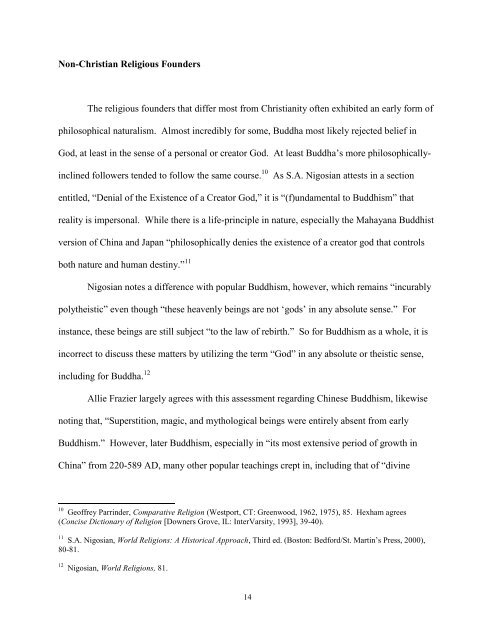Published by
299z7CN
299z7CN
Create successful ePaper yourself
Turn your PDF publications into a flip-book with our unique Google optimized e-Paper software.
Non-Christian Religious Founders<br />
The religious founders that differ most from Christianity often exhibited an early form of<br />
philosophical naturalism. Almost incredibly for some, Buddha most likely rejected belief in<br />
God, at least in the sense of a personal or creator God. At least Buddha’s more philosophicallyinclined<br />
followers tended to follow the same course. 10<br />
As S.A. Nigosian attests in a section<br />
entitled, “Denial of the Existence of a Creator God,” it is “(f)undamental to Buddhism” that<br />
reality is impersonal. While there is a life-principle in nature, especially the Mahayana Buddhist<br />
version of China and Japan “philosophically denies the existence of a creator god that controls<br />
both nature and human destiny.” 11<br />
Nigosian notes a difference with popular Buddhism, however, which remains “incurably<br />
polytheistic” even though “these heavenly beings are not ‘gods’ in any absolute sense.” For<br />
instance, these beings are still subject “to the law of rebirth.” So for Buddhism as a whole, it is<br />
incorrect to discuss these matters <strong>by</strong> utilizing the term “God” in any absolute or theistic sense,<br />
including for Buddha. 12<br />
Allie Frazier largely agrees with this assessment regarding Chinese Buddhism, likewise<br />
noting that, “Superstition, magic, and mythological beings were entirely absent from early<br />
Buddhism.” However, later Buddhism, especially in “its most extensive period of growth in<br />
China” from 220-589 AD, many other popular teachings crept in, including that of “divine<br />
10 Geoffrey Parrinder, Comparative Religion (Westport, CT: Greenwood, 1962, 1975), 85. Hexham agrees<br />
(Concise Dictionary of Religion [Downers Grove, IL: InterVarsity, 1993], 39-40).<br />
11 S.A. Nigosian, World Religions: A Historical Approach, Third ed. (Boston: Bedford/St. Martin’s Press, 2000),<br />
80-81.<br />
12 Nigosian, World Religions, 81.<br />
14


